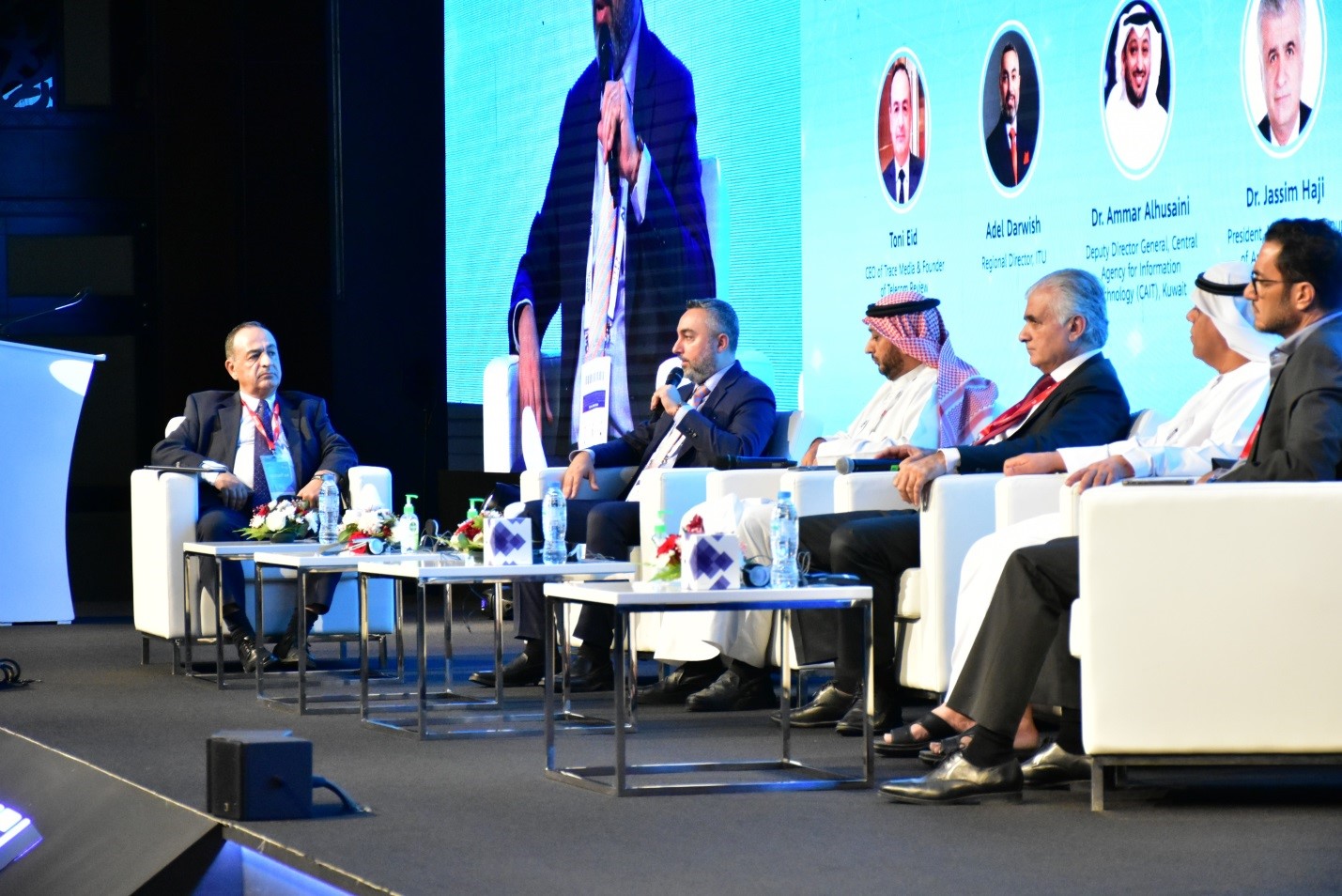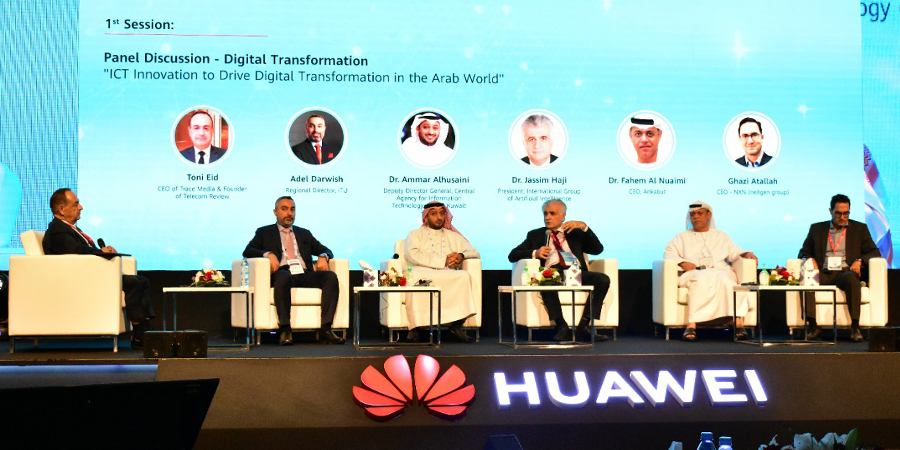Huawei’s Arab Innovation Day Conference took place on October 19 at Dubai World Trade Centre‘s Al Multaqa Ballroom on the sidelines of GITEX Global. The packed hall had attendees ranging from government leaders, academia, industry experts, and regulators to discuss and share the role of ICT across the Arab region.
The initial key note speeches were addressed by Catherine Chen, senior vice president, director of the board & president of public affairs & communications dept, Huawei; HE. Dr. Ahmad Belhoul Al Falasi, minister of state for entrepreneurship and SMEs, UAE; HE. Arkan Shahab, minister of communications, Iraq; HE. Ahmad Al Hanandeh, minister of digital economy and entrepreneurship, Jordan; H.E. Sameera Ebrahim Bin Rajb, The Special Envoy for thye Royal Court, minister, Bahrain; Wang Tao (David Wang), executive director of the board, chairman of ICT Infrastructure managing board.
The first session of panel discussion covered digital transformation under the theme ‘ICT innovation to drive digital transformation in the Arab World’.
The speakers featured in the panel comprised of Adel Darwish, regional director, ITU; Dr. Ammar Alhusaini, deputy director general, central agency for information technology (CAIT), Kuwait; Dr Jassim Haji, president, international group of artificial intelligence; Dr. Fahem Al Nuaimi, CEO, Ankabut; and Ghazi Atallah, CEO, NXN.
Toni Eid, CEO of Trace Media and founder of Telecom Review chaired the discussion.
The first question put across by Eid to the panel was: What are the gaps and challenges in the digital transformation journey that ICT ecosystem stakeholders need to overcome, particularly in light of the pandemic influence?
Taking on the question, Dr Fahem Al Nuaimi said that from an educational perspective, the ICT sector needed to foster quickly in terms of not only storage capacity but faster networks for the education faculties for them to be able to deliver the goods to students. He felt that ICT innovation in education sector was at the start and needed efforts from vendors, governments and system integrators to establish this ecosystem in the region.
Adding to the conversation, Dr Ammar Alhusaini said that without a roadmap, organizations might risk the change of “cruising in the wrong direction.” He also said the human factor in digital transformation is important. He said that digital skills were in shortage and that reskilling and upskilling in the new areas of technology was key. He stressed on the importance of “understanding the real meaning of digital transformation.” He also cited a McKinsey report of 83% of digital transformation initiatives failing because of a good strategy.
Adding an artificial intelligence (AI) perspective to the discussion, Dr. Jassim Haji said that digital transformation represented a wide statement interpreted differently by different people. He added that “digital transformation has become AI transformation.” He said that what was happening in 5 to 6 years was now happening at a much faster pace. “Deep learning is taking over, cyberspace has witnessed a lot of hackers using AI to do so. AI is a must to defend your entire network, there is no balance between victims and attackers,” he stressed.

During the panel discussion
The second part of the question, Eid steered the conversation towards how each member of the ICT industry (ITU, GSMA, regulators, ICT ministries, operators, technology vendors, etc) can contribute to overcome the pain points of digital transformation and contribute to its future path of digital transformation in the Arab World.
“Technology is speeding fast, whereas regulation and policy are very slow. ICT members should foster regulation, policy and governance,” he responded. He emphasized the need for the regulators to come up with relevant policies in an urgent manner.
From his viewpoint, Adel Darwish felt that digital transformation was seen and perceived differently by different sections of people. “At ITU, we have different stakeholders where we try to develop best case practices. We try to engage with government and vendors by taking into account the national agenda of nations in ICT sector,” he said. He also added that cybersecurity is an important element. “Who takes the lead? Is it vendors, ITU or ICT sectors?,” he inquired. “Digital transformation is a transformation of business, of end user. At ITU, we bring stakeholders together and assist governments develop such indicators that we collate from globally.”
From a governmental perspective, Dr. Ammar Alhusaini said that digital transformation was “all about the citizens and it is up to the government to quicken the process.” He also said that international indices have shown that some countries from the Arab world lacked in electronic services. When while Dr. Jassim Haji stressed upon the importance of regulation when it came to the adoption of newer technologies.
Ghazi Atallah added that in the front end, people are interacting online, and that efforts needed to be focused on facilitating the back end to enhance user experience. He suggested that we should ask the question of what do we need to transform internally either as government or enterprise. “It has to be outcome-based transformation,” he stressed. He said that the backhand processes needed to be addressed holistically. He suggested identifying the missing factor, the whys and hows before designing the processes. “We want to be related to be simple solutions based on outcome.”
It has been a global acceptance that the Covid 19 pandemic accelerated digital transformation; but the conversation tried to understand what the positive outcomes from the event were.
To that, Adel Darwish said the “pandemic benefited all the industries that moved in the direction of innovation.” He cited the examples of video conferencing products like Zoom and Microsoft who were able to roll out innovative communication solutions as well as governments using technology to provide better health solutions. “Whoever innovated and made it simple benefited, and that should be the way forward,” he opined.
Dr. Fahem Al Nuaimi said that from an education point of view, it was very difficult to convince people to adopt cloud; however, due to the pandemic the adoption of cloud, along with AI, IoT. “Secondly, it has changed rules. Today, you can get PhD degrees online, so technology has evolved,” he said. He also pointed out that technology has expanded vastly but there are “pain and challenges.” “Data base management is a problem, security has become a challenge.”
Dr. Jassim Haji viewed the responses during the pandemic in our region as more of a “patching” rather than innovation as compared to some developed countries. However, he said that many areas opened the virtual interaction and said that more of international virtual class rooms will come up. “Virtual counselors will directly interact with students. Chatbots will play a major role, communication will be easier,” he said.
Responding to the view, Dr. Ammar Alhusaini felt that the pandemic accelerated the digital transformation were based on the readiness of countries. He said that the pandemic taught countries how to operate as government and countries in terms of infrastructure, data and security. “From IT point of view, cloud application helped us to fight the pandemic. You need to get ready for the next phase from what we learnt. He also stressed on importance of the hybrid model in the post pandemic economic recoveries.
Ghazi Atallah cited the example of Uber, the hailing taxi app, and how it changed the way we ride taxis. He stressed that it is still the taxis that take us from point A to point B but it is the innovation in leveraging technology that changed the way you interacted using technology. He stressed enterprises need to figure out how certain technology will disrupt and impact their industry. “People who understand this best will move forward. Dubai is using technology to achieve this end,” he added.
The final question of the panel discussion was: “In the 4th industrial revolution time, integration of new technologies such as 5G, Cloud & AI for the benefit of driving digital transformation, verticals and industries businesses and services growth and building the digital economy is key. Tell us about your vision and plans to integrate the deployment of advanced technologies in an open collaborative way. What are the collaboration areas you see as a priority, needed for shared success?
Adel Darwish stressed on the importance of collaboration between multi-stakeholder in utilizing new technologies and making sure that everyone is part of the ecosystem. “Private and public stakeholders must contribute,” he stressed.
Dr. Ammar Alhusaini said that from the government aspect, it was the citizens that mattered the most. He stressed on the need of using data to support to make decisions. “We are working and helping government services to migrate to cloud as well as adopting AI and IoT in the government landscape,” he said.
Dr. Jassim Haji predicted the rise of tech such as internet of behavior (IoB) and said that enterprises needed to be ready to be driven by the data emanating from such technologies. “IoB in the next 3 to 4 years will connect over 3 billion people globally,” he quoted a Gartner finding. “Technology of edge computing is gaining ground and they industry is going hybrid,” he said.
“We are working with cloud technology for education, using the emerging technology, big data. From a network, 5G will play a key role for online connectivity for rural education,” Dr. Fahem Al Nuaimi said. “From application perspective, we are working with Huawei for smart campus. We will lead technology transformation in education,” he explained.
Putting his final thoughts across, Ghazi Atallah said that governments’ role was to put regulation and policies in place to enable innovation to make it easier for startups to innovate, be it business and cities. “We must understand the roles of each of these entities. Be a facilitator and enabler,” he opined.










